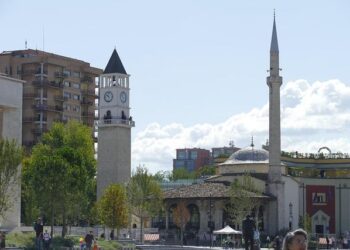Albanian Prime Minister Edi Rama has publicly asserted that Russia has no intention of attacking any other European countries, addressing widespread concerns amid ongoing geopolitical tensions. In a recent statement covered by Al Jazeera, Rama emphasized a cautious but hopeful outlook on regional security, seeking to clarify Moscow’s stance as the conflict in Ukraine continues to dominate international discourse. This development adds a significant perspective to the complex security dynamics in Europe.
Russia’s Commitment to European Stability Reassessed by Albanian Leadership
Albanian Prime Minister Edi Rama has publicly stated that Russia harbors no intentions to launch attacks on other European countries beyond its current geopolitical engagements. Addressing concerns amid ongoing tensions in Eastern Europe, Rama emphasized that Moscow’s strategic focus remains defensive rather than expansionist. This perspective offers a nuanced understanding that counters more alarmist narratives prevalent in international media. According to Rama, it is essential for European leaders to engage in open dialogue and reinforce diplomatic channels to ensure regional stability.
Rama’s remarks also highlighted several key factors influencing Russia’s approach towards Europe, including:
- Economic interests: Maintaining trade ties with European nations.
- Security considerations: Avoiding overextension of military commitments.
- Political alliances: Navigating relations with NATO and the EU carefully.
| Aspect | European Stability Role |
|---|---|
| Diplomacy | Promotes dialogue to reduce conflicts |
| Military Posture | Defensive, not offensive |
| Economic Ties | Key to sustained cooperation |
Analyzing the Strategic Implications of Edi Rama’s Statement on Regional Security
Edi Rama’s assertion that Russia will not attack any other European country introduces a nuanced perspective into the ongoing discourse on regional security dynamics. This statement challenges prevailing narratives centered around escalating tensions and potential aggression, suggesting a strategic recalibration by Moscow. By publicly downplaying the threat of further territorial incursions, Rama may be positioning Albania as a voice of cautious optimism within the Balkans, subtly urging European allies to balance vigilance with diplomacy. This stance also reflects Albania’s intricate geopolitical considerations, including maintaining constructive ties with both Western institutions and neighboring powers.
The implications for regional security policies are multifaceted. Policymakers must now weigh the possibility of reduced immediate military confrontations against persistent uncertainties surrounding Russia’s long-term objectives. Key strategic takeaways include:
- Reassessing NATO’s posture: Encouraging tailored approaches rather than blanket deterrence strategies.
- Strengthening diplomatic channels: Facilitating dialogue to prevent miscalculations.
- Enhancing regional cooperation: Promoting unity among Balkan states to manage shared security challenges.
| Factor | Potential Impact |
|---|---|
| Russian Intent | Shift towards consolidation rather than expansion |
| Albanian Diplomacy | Bridge between Western alliances and regional actors |
| NATO Strategy | Possible recalibration with emphasis on flexibility |
| Security Environment | Combination of caution and engagement |
Recommendations for European Diplomacy in Response to Russia’s Asserted Restraint
In light of the Albanian Prime Minister Edi Rama’s recent assertion that Russia will not initiate attacks against other European nations, European diplomacy must pivot towards a framework that balances vigilance with strategic dialogue. Crafting policies that emphasize open communication channels while maintaining robust defense postures can reduce tensions without escalating regional insecurity. Embracing multilateral diplomacy, Europe’s leaders should leverage forums such as the OSCE and the Council of Europe to reaffirm commitments to territorial integrity and international law, fostering an atmosphere of trust based on transparency rather than suspicion.
Moreover, strategic patience complemented by targeted diplomatic initiatives will be essential. European nations could consider the following measures to reinforce stability:
- Enhanced intelligence sharing to monitor real-time developments and forestall potential miscalculations.
- Regular high-level dialogues between EU and Russian officials aimed at managing divergent interests.
- Development of conflict prevention mechanisms emphasizing early-warning systems and crisis communication strategies.
| Diplomatic Tool | Objective | Expected Outcome |
|---|---|---|
| Confidence-Building Measures | Reduce mistrust | Improved dialogue climate |
| Sanctions Review | Calibrate pressure | Encourage compliance |
| Crisis Hotlines | Prevent escalation | Immediate conflict de-escalation |
In Summary
In closing, Albanian Prime Minister Edi Rama’s assertion that Russia will not launch attacks against any other European nations offers a cautious perspective amid ongoing tensions on the continent. While his statement may provide a measure of reassurance, the geopolitical landscape remains complex and fluid. Analysts and policymakers alike will continue to monitor developments closely as Europe navigates the challenges posed by Russian actions and broader security concerns.
















